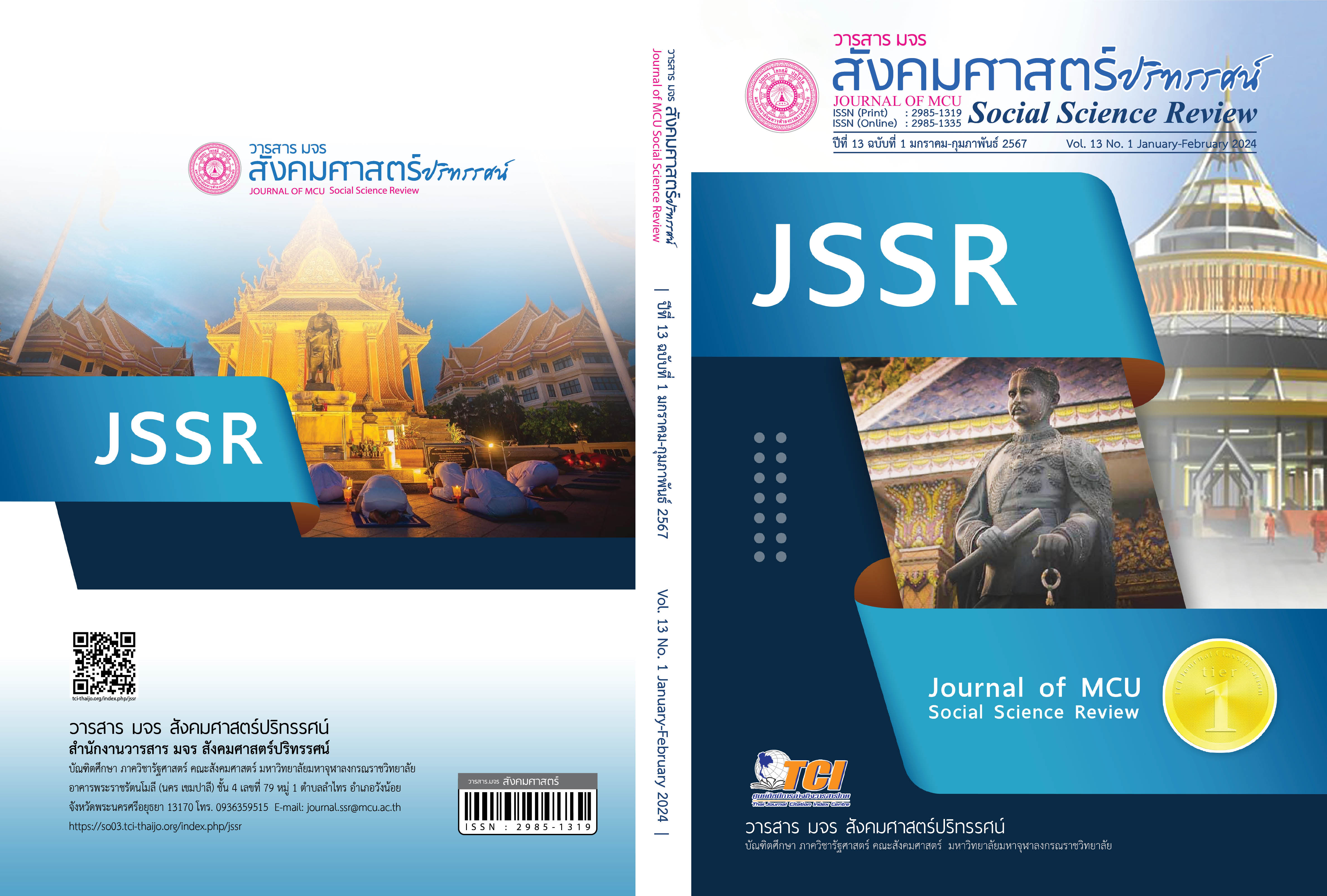แนวทางการพัฒนาภาวะผู้นำทางวิชาการในยุคดิจิทัลของผู้บริหารโรงเรียน
คำสำคัญ:
ภาวะผู้นำทางวิชาการ, ยุคดิจิทัล, ผู้บริหารโรงเรียนบทคัดย่อ
การบริหารโรงเรียนในระดับการศึกษาขั้นพื้นฐานในปัจจุบันเผชิญกับความท้าทายมากมาย โดยเฉพาะในช่วงสถานการณ์แพร่ระบาดของไวรัสโควิด-19 ผู้บริหารโรงเรียนในระดับการศึกษาขั้นพื้นฐานจำเป็นต้องได้รับการพัฒนาภาวะผู้นำทางวิชาการในยุคดิจิทัลทั้งในด้านคุณลักษณะส่วนบุคคลทางดิจิทัล ด้านการบริหารงานตามพันธกิจที่บูรณาการดิจิทัล และด้านความสามารถทางวิชาการเชิงดิจิทัล โดยแนวทางการพัฒนาภาวะผู้นำทางวิชาการในยุคดิจิทัลสำหรับผู้บริหารโรงเรียนสามารถดำเนินการได้อย่างหลากหลาย ทั้งในมิติด้านเวลาที่ใช้ในการพัฒนาผู้บริหารโรงเรียน มิติด้านเวลาที่เชื่อมโยงกับการเข้าสู่ตำแหน่ง มิติด้านวิธีการ มิติด้านการประยุกต์ใช้เทคโนโลยีดิจิทัล และมิติด้านการพัฒนาแบบผสมผสานวิธี ซึ่งมีการบูรณาการนวัตกรรมและแพลตฟอร์มดิจิทัลมาใช้ในการพัฒนาภาวะผู้นำทางวิชาการในยุคดิจิทัลของผู้บริหารโรงเรียน รวมทั้งมีการกำหนดหัวข้อและประเด็นการพัฒนาผู้บริหารโรงเรียนให้มีความทันสมัยและท้าทายการจัดการศึกษาในยุคดิจิทัลนี้ อันจะช่วยให้ผู้บริหารโรงเรียนมีความพร้อมและศักยภาพในการขับเคลื่อนโรงเรียนสู่การจัดการศึกษาที่มีคุณภาพสำหรับการพัฒนาผู้เรียนในบริบทสังคมดิจิทัล รวมทั้งสามารถส่งเสริมขีดความสามารถและความก้าวทางวิชาชีพของครูและบุคลากรทางการศึกษาในยุคดิจิทัลนี้ได้อย่างเป็นระบบ ตลอดจนนำไปสู่การยกระดับคุณภาพการจัดการศึกษาและประสิทธิผลการเรียนรู้ของผู้เรียนในอนาคตได้อย่างยั่งยืน
เอกสารอ้างอิง
กนกอร สมปราชญ์. (2560). ภาวะผู้นำและภาวะผู้นำการเรียนรู้สำหรับผู้บริหารสถานศึกษา. ขอนแก่น: คลังนานา.
จิติมา วรรณศรี. (2563). การบริหารจัดการศึกษายุคดิจิทัล. พิษณุโลก: โรงพิมพ์รัตนสุวรรณการพิมพ์ 3.
ชัยเสฏฐ์ พรหมศรี. (2561). ภาวะผู้นำสำหรับผู้บริหารองค์การ : แนวคิด ทฤษฎีและกรณีศึกษา. กรุงเทพฯ: สำนักพิมพ์ปัญญาชน.
โชติชวัล ฟูกิจกาญจน์. (2562). การจัดการขีดความสามารถ. กรุงเทพฯ: สำนักพิมพ์ปัญญาชน.
ธีระ รุญเจริญ. (2557). ความเป็นมืออาชีพในการจัดและบริหารการศึกษาเพื่อปฏิรูปรอบ 2 และประเมินภายนอกรอบ 3 (พิมพ์ครั้งที่ 9). กรุงเทพฯ: ข้าวฟ่าง.
_____. (2562). ทิศทางการจัดการศึกษาเรียนรู่สู่การศึกษา 4.0 ในยุคดิจิทัล. ใน จิณณวัตร ปะโคทัง (บรรณาธิการ). รวมบทความการบริหารการศึกษากับการพัฒนาการจัดการเรียนรู้สู่การศึกษาในยุคดิจิทัล ชุดที่ 1. (น. 8-9). อุบลราชธานี: ห้างหุ้นส่วนจำกัดวิทยาการพิมพ์ 1973.
บุญอนันต์ พินัยทรัพย์. (2562). การพัฒนาทรัพยากรมนุษย์ในยุคดิจิทัล. นนทบุรี: รัตนไตย.
พฤทธิ์ ศิริบรรณพิทักษ์. (2563). พลิกโฉมนวัตกรรมการพัฒนาสมรรถนะผู้เรียนในสังคมดิจิทัล. รายงานการสัมมนาทางวิชาการ. เชียงใหม่: มหาวิทยาลัยราชภัฏเชียงใหม่.
มาเรียม นิลพันธุ์. (2556). ประเมินผลหลักสูตรแกนกลางการศึกษาขั้นพื้นฐาน พุทธศักราช 2551 ในโรงเรียนต้นแบบการใช้หลักสูตร. นครปฐม: มหาวิทยาลัยศิลปากร.
ราชบัณฑิตยสถาน. (2558). พจนานุกรมศัพท์ศึกษาศาสตร์ร่วมสมัย ฉบับราชบัณฑิตยสถาน. กรุงเทพฯ: ห้างหุ้นส่วนสามัญนิติบุคคลเจี้ยฮั้ว.
สมเกียรติ อินทสิงห์. (2563). การบริหารหลักสูตรสถานศึกษา. เชียงใหม่: มหาวิทยาลัยเชียงใหม่.
สำนักงานเลขาธิการสภาการศึกษา. (2563). การมีส่วนร่วมในการจัดการศึกษาของภาคประชาสังคม/ผู้มีส่วนได้ส่วนเสียตามร่างพระราชบัญญัติการศึกษาแห่งชาติ. กรุงเทพฯ: สำนักมาตรฐานการศึกษาและพัฒนาการเรียนรู้.
_____. (2565). รายงานการศึกษาไทย พ.ศ. 2562 - 2564. กรุงเทพฯ: พริกหวานกราฟฟิค.
สืบสกุล นรินทรางกูร ณ อยุธยา. (2564). การบริหารทรัพยากรทางการศึกษาแนวใหม่. กรุงเทพฯ: สำนักพิมพ์จุฬาลงกรณ์มหาวิทยาลัย.
สุกัญญา แช่มช้อย. (2562). การบริหารสถานศึกษาในยุคดิจิทัล (พิมพ์ครั้งที่ 2). กรุงเทพฯ: สำนักพิมพ์จุฬาลงกรณ์มหาวิทยาลัย.
Arbuckle, A. (2020). Opportunities for Social Knowledge Creation in the Digital Humanities. In C. Crompton, R. J. Lane, & R. Siemens (Eds.), Doing More Digital Humanities: Open Approaches to Creation Growth and Development. (pp. 290-300). New York, NY: Routledge.
Auld, G. & Djabibba, L. (2015). Using digital technologies with Aboriginal and Torres Strait Islander students. In M. Henderson & G. Romeo (Eds). Teaching and Technologies: Big issues and critical questions. (pp. 57-69). Melbourne, Australia: Cambridge University Press.
Brooks, J. S., & Normore, A. H. (2018). Foundation of Educational Leadership: Developing Excellent and Equitable Schools. New York, NY: Routledge.
Center on Great Teachers and Leaders. (2016). Aligning Leadership Standards to the Professional Standards for Educational Leaders: A Toolkit and Crosswalk. Washington, DC: Author.
Francera, S., & Bliss, J. (2011). Instructional Leadership Influence on Collective Teacher Efficacy to Improve Student Achievement. Leadership and Policy in Schools, 10(3), 349-370.
Friend, C., et al. (2020). Starting with Students: Open Course Design. In C. Crompton, R. J. Lane, & R. Siemens (Eds.), Doing More Digital Humanities: Open Approaches to Creation Growth and Development. (pp. 239- 250). New York, NY: Routledge.
Gorton, C. (2016). Building Digital Leadership and Resilience in The UK’s Cultural Sector. Retrieved September 1, 2020, from https://digileaders.com/wp
Kruse, K. (2020). Top 5 Leadership Development Trends for 2020. Retrieved March 7, 2021, from https://www.forbes.com/sites/
Lunenburg, F. C. & Ornstein, A. C. (2012). Educational Administration: Concepts and Practices. Belmont, CA: Wadsworth Cengage Learning.
Martin, M. E. (2018). Qualities of Instructional Leadership Among Principals in High-Performing Christian Schools. Journal of Research on Christian Education, 27(2), 157–182.
Navaridas-Naldaa, F., et al. (2020). The Strategic Influence of School Principal Leadership in the Digital Transformation of Schools. Computers in Human Behavior, 112, 345-365.
Sheninger, E. (2020). The Vital Role of Digital Leadership in Transforming Education. Retrieved March 8, 2021, from www.esheninger.blogspot.com
Smyth, K., et al. (2015). Technologies and Academic Development. In D. Baume & C. Popovic (Eds). Advancing Practice in Academic Development. (pp. 121-141). New York: Routledge.
Sood, K., et al. (2018). Becoming a Successful School Leader: Developing New Insights. New York, NY: Routledge.
Schuck, S., et al. (2013). Mobilising Teacher Education: A Study of a Professional Learning Community. Teacher Development, 17(1), 1-18.
Tait, A. & Faulkner, D. (2016). Edupreneur: Unleashing Teacher – led Innovation in Schools. Melbourne: John Wiley & Sons Australia, Ltd.
Wallin, A., et al. (2020). Government Workers’ Stories about Professional Development in a Digitalized Working Life. Vocations and Learning, 13(3), 439-458.
Zhong, L. (2017). Indicators of Digital Leadership in the Context of K-12 Education. Journal of Educational Technology Development and Exchange, 10(1), 27-40.
ดาวน์โหลด
เผยแพร่แล้ว
รูปแบบการอ้างอิง
ฉบับ
ประเภทบทความ
สัญญาอนุญาต
ลิขสิทธิ์ (c) 2024 วารสาร มจร สังคมศาสตร์ปริทรรศน์

อนุญาตภายใต้เงื่อนไข Creative Commons Attribution-NonCommercial-NoDerivatives 4.0 International License.
เพื่อให้เป็นไปตามกฎหมายลิขสิทธิ์ ผู้นิพนธ์ทุกท่านต้องลงลายมือชื่อในแบบฟอร์มใบมอบลิขสิทธิ์บทความให้แก่วารสารฯ พร้อมกับบทความต้นฉบับที่ได้แก้ไขครั้งสุดท้าย นอกจากนี้ ผู้นิพนธ์ทุกท่านต้องยืนยันว่าบทความต้นฉบับที่ส่งมาตีพิมพ์นั้น ได้ส่งมาตีพิมพ์เฉพาะในวารสาร มจร สังคมศาสตร์ปริทรรศน์ เพียงแห่งเดียวเท่านั้น หากมีการใช้ภาพหรือตารางหรือเนื้อหาอื่นๆ ของผู้นิพนธ์อื่นที่ปรากฏในสิ่งตีพิมพ์อื่นมาแล้ว ผู้นิพนธ์ต้องขออนุญาตเจ้าของลิขสิทธิ์ก่อน พร้อมทั้งแสดงหนังสือที่ได้รับการยินยอมต่อบรรณาธิการ ก่อนที่บทความจะได้รับการตีพิมพ์ หากไม่เป็นไปตามข้อกำหนดเบื้องต้น ทางวารสารจะถอดบทความของท่านออกโดยไม่มีข้อยกเว้นใดๆ ทั้งสิ้น





